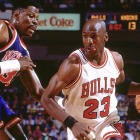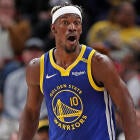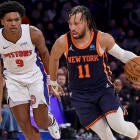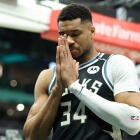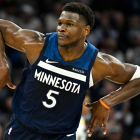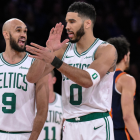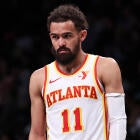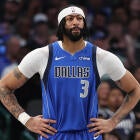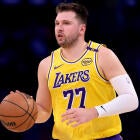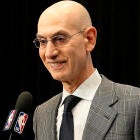Michael Jordan dominated the NBA like few athletes, if any at all, have ever owned their sport. Six titles. Six Finals MVPs. Five league MVPs. Ten-time scoring champ. Two-time Olympic gold medalist. Defensive Player of the Year. Rookie of the Year. And on down the list.
For most people's money, Jordan is the greatest basketball player to ever live, and within his era the gap between him and the rest of the pack of superstars was far wider than it is now. Whereas LeBron James has been beaten in the Finals by Stephen Curry, Kevin Durant, Dirk Nowitzki and Tim Duncan, and had his reign as the face of the league at least threatened by Curry at one point, Jordan was truly peerless.
Does that mean he didn't have any rivals? Not necessarily. He had one, for sure, who got completely under his skin and still is doing so to this day. He had others for myriad factors, including the weighted importance of intra-conference clashes in those days. Here are the five biggest rivals of Michael Jordan's career, with a few honorable mentions rounding out the list.
1. Isiah Thomas
It's been said that the word "rivalry" can't be invoked until both sides have tasted victory, and therefore pose a real, proven threat to the other. In that way, Isiah Thomas was the only true personal rival Michael Jordan had during his career. In his prime, nobody else beat him.
Thomas' Pistons eliminated Jordan's Bulls in both the 1989 and 1990 Eastern Conference finals en route to winning back-to-back championships, and with their brutal enforcement of the Jordan Rules, they beat the hell out of His Airness along the way. During "The Last Dance" -- ESPN's 10-part documentary chronicling the 1997-98 Bulls -- Jordan said he "hated" the Pistons during his career and that the hate "carries even to this day."
Nobody got, and apparently continues to get, under Jordan's skin like Thomas, whose Pistons famously walked off the court without shaking the Bulls' hands when Chicago finally got over the hump and swept Detroit in the 1991 conference finals. A year later, it is widely believed -- and credibly reported -- that Jordan played a role in keeping Thomas off the 1992 Dream Team, which Thomas is still miffed about.
The digs go both ways. In the wake of "The Last Dance", which has portrayed Jordan taking an unusual beating during the 1980s, Thomas made it clear that Jordan doesn't deserve any particular sympathy for having endured a notoriously physical era of NBA basketball.
"This generation thinks that the only one getting hit back then was Jordan," Thomas said. "I can say on this television station here today, there is no player during that period of time that got hit and punished more than myself. And I have all the scars to prove it."
Thomas, in fact, went so far as to tell CBS Sports' Bill Reiter than Jordan was the fourth-toughest player he had to go against in his career. Fourth! To Isiah, Kareem Abdul-Jabbar, Magic Johnson and Larry Bird were all tougher matchups. Can you imagine how much that's eating at the famously petty M.J. right now? But that's the way it goes when a rival, in terms of head-to-head playoff matchups, got the best of you more times than you got the best of him.
Jordan can't stand this, but it's true. Thomas was, and is, the only true rival Jordan had during his career.
2. Patrick Ewing
Ewing gets No. 2 status because those 1990s Bulls and Knicks teams are inextricably linked, even if the "rivalry" was entirely one-sided. The Bulls eliminated the Knicks in 1989, 1991, 1992, 1993 and 1996. New York never defeated Chicago in the playoffs when Jordan was on the team.
The most heartbreaking loss Jordan and the Bulls delivered the Knicks was in the 1993 Eastern Conference finals. The Knicks jumped out to a 2-0 lead in the series and it looked like this would finally be their year to get past Chicago and into the Finals. Jordan and the Bulls then rattled off four straight wins, including the unforgettable "Charles Smith game" in which Jordan and Scottie Pippen denied Smith at point-blank range four consecutive times to seal a last-second Game 5 victory.
In some ways, Ewing was just the best player on the Knicks, but the rivalry wasn't really a personal one with Jordan, or at least it never felt that way. It was more Bulls-Knicks than it was Jordan-Ewing. Jordan was more often going toe-to-toe with the likes of John Starks, and Ewing, though a Hall of Fame player, was never on Jordan's level individually.
In that way, this sort of feels like young Paul George and the Pacers pushing LeBron James and the Heat. George was not on James' level individually. It's hard to say those two were rivals. But George was the best player on Indiana, which Miami had to go through in two straight conference finals, with the Pacers actually pushing the Heat to Game 7 in 2013. Had that gone on for a few more seasons, the Pacers getting close but never over the hump, LeBron and George could've become the new version of Jordan and Ewing.
3. Magic Johnson
Johnson was Jordan's rival in two ways. One, as opponents on the court; they didn't go head-to-head much, but when they did there was so much on the line, with the Bulls defeating the Lakers in the 1991 Finals to secure Jordan's first championship. And two, Johnson was the league's unofficial torchbearer. By the time 1991 had rolled around, Jordan was the league's best player, but it was still, to at least some degree, Magic's league. Johnson was Jordan's rival in a mythical sense as much as he was on the court.
In "The Last Dance," Jordan talked about the need to win a championship to be regarded in the same breath as Magic and Larry Bird. Those guys were winners. Jordan was the great individual talent who couldn't necessarily lift the team around him. Jordan was fighting all that when he squared off with Magic, who was coming off consecutive league MVP awards in 1989 and 1990.
There has long been talk that the Lakers team Jordan and the Bulls beat was not the "Showtime" Lakers, and it wasn't. Had L.A. still been the "Showtime" Lakers when they met Jordan's Bulls, which probably would've meant more than one matchup, Magic would be No. 1 on this list. But that Lakers team was still really good.
Byron Scott and James Worthy were both under 30 years old and averaged a combined 35 points per game that season. Vlade Divac was one of the smoothest centers who never gets talked about. And again, Magic was still playing at an MVP level -- averaging 19 and 12 in '91-92 -- before his abrupt retirement following those Finals due to his HIV diagnosis.
The Lakers were the Vegas favorite going in, and after they took Game 1 most everybody thought they would take the series. But Jordan and the Bulls stormed back to win four straight, claim the title, and in doing so, officially handed the keys to the league to Jordan.
4. Charles Barkley
Aside from Magic, Barkley is the only guy on this list who was ever talked about as the second-best player in the world. He was probably the second-best player on the Dream Team. He won league MVP in 1993 and carried the Suns to the Finals without a Scottie Pippen-level wingman (although Kevin Johnson was, incredibly, All-NBA second or third team five out of six years from 1989-1994).
Some of it was because of their developing friendship and their shared love of golf and gambling, but in the end, Barkley and Jordan's names were more closely connected than most players who only square off once in their careers on a meaningful stage. Still, it's that one year, 1993, that lands Barkley on this list. He was phenomenal that season, elevating himself to at least the fringe of the Jordan conversation.
And listen, the Suns were closer to pushing the Bulls to the brink, or perhaps beating them, in those 1993 Finals that you might remember. They were within a couple possessions the whole fourth quarter of Game 4 despite Jordan finishing with 55 points. Barkley just couldn't get the Suns over the top despite finishing with 32 points, 12 rebounds and 10 assists. If the Suns -- who wound up winning Game 5 -- pull that game out, that series is 2-2 and anyone's ballgame. Even without that, it took a last-second John Paxson 3-pointer in Game 6 to oust the Suns, who were that close to forcing a Game 7 on their home floor.
5. Karl Malone
Malone is the only player on this list to have lost to Jordan twice in the Finals, and the Jazz were within shouting distance both times. In 1997 they had the series tied 2-2, and in 1998 they were within one Jordan hanging follow-through jumper of forcing a Game 7.
Malone doesn't feel like a Jordan rival. Back then conference affiliation meant more than it does today. Even though the Knicks and Pistons never faced Jordan in the Finals, their connection to him was deeper because of the conference connection. The Western Conference, small-market Jazz almost existed in another NBA world until they collided with the Bulls for a few weeks in June.
Still, Malone was a beast. He was never in the "best player in the world" conversation, but he won league MVP in 1997 and 1999, (the latter of which was the first year of Jordan's second retirement).
Honorable Mentions
- Reggie Miller: Miller's 1990s rivalry was much more with the Knicks. In fact, Miller and Jordan only met in the playoffs one time, in 1998, when the Pacers pushed the Bulls to Game 7 in the conference finals. Miller was a legendary '90s NBA player who authored iconic playoff moments, but he was never close to Jordan's league individually and they just didn't face each other enough on the big stage to call it a serious rivalry.
- Clyde Drexler: Jordan and Drexler are connected in a couple ways. First, the Trail Blazers, at least in part, passed on Jordan in the 1984 NBA Draft because they already had Drexler, who played the same position. In those days, positions were a much bigger deal than they are in today's league that favors like-sized/like-skilled players with interchangeable and versatile virtues. Second, Drexler's Blazers met Jordan's Bulls in the 1992 Finals, with the Bulls prevailing 4-2 for Jordan's second championship. People tried to put Drexler in the same breath as Jordan for a while, but it was just never close.
- Larry Bird: When I noted at the top that nobody else on this list defeated Jordan in his prime, Larry Bird was the reason for the qualification. The Celtics eliminated the Bulls in both 1986 and 1987, Jordan's second and third year in the league. Yes, Jordan had already established himself as an elite player; he won his first scoring title in 1987, averaging a ridiculous 37.1 points per game. But the Bulls were nowhere near ready to compete with the Celtics (the were swept in both playoff series). Jordan was an upstart superstar, but nobody was pitting him individually against Bird, who had won three consecutive league MVP awards dating back to the year before Jordan even got into the league. The prime timelines just didn't cross on a big enough stage for these two to be real rivals, but there is enough there with Jordan chasing Bird, along with Magic, for the keys to the league that they do meet the minimum rival requirement.
![[object Object] Logo](https://sportshub.cbsistatic.com/i/2020/04/22/e9ceb731-8b3f-4c60-98fe-090ab66a2997/screen-shot-2020-04-22-at-11-04-56-am.png)









